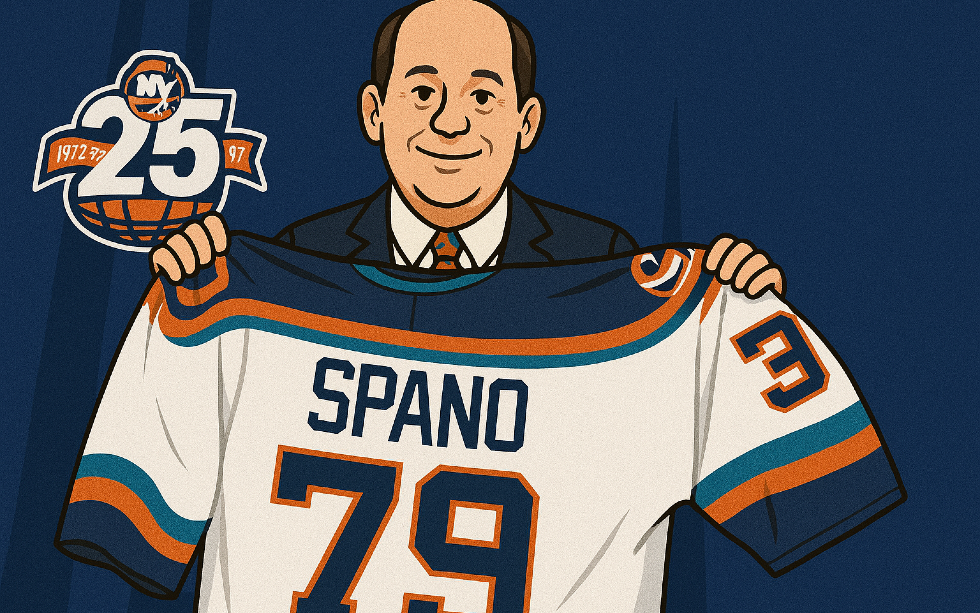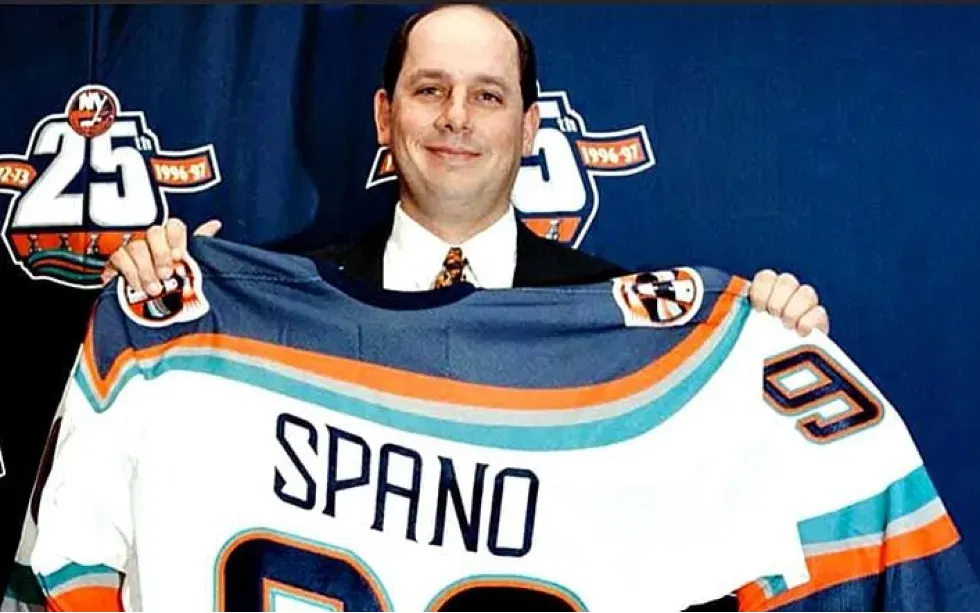The Craziest, Funniest, and Most Bizarre Sports Owner Story I've Ever Read
The tale of this infamous sports owner actually has a lot to teach us about relationships.

Investing in others is built on the premise that we have something to offer. This reminds me of this humorous story that took place several decades ago.
As a fan of hockey and business, one of the most fascinating, thought-provoking, and frankly hilarious documentaries I’ve ever watched was ESPN’s 30 for 30 Big Shot film of the former owner of the New York Islanders, John Spano. In case you didn’t grow up in the same hockey bubble in which I was raised, it’s important to note that from 1980-1983, the Islanders won four straight Stanley Cups before the eventual rise of Wayne Gretzky and the young, dynamic Edmonton Oilers.
While one might think a team could live off this sustained success for decades, by 1996, the Islanders were in deep trouble. The team on the ice was no longer good, attendance was low, the arena in disrepair, and the financial state of the team in jeopardy. It was a terrible mess. But into this situation, seemingly out of nowhere, stepped a savior.

John Spano was widely respected as a Texas billionaire and seen as the perfect partner to save a dying franchise and restore it to its former glory years. At only 32 years of age, Spano was a soft-spoken man who appeared to have the shy, awkward, ridiculous self-confidence that would finally offer a stabilizing presence to a fan base that had suffered one disappointment after the next. As news of Spano’s interest grew, excitement spread, and the Nassau Coliseum rang with chants of “save us Spano” as fans clung to the hope that they finally had someone who cared about them and the team they loved.
Fully embracing this new role, in October of 1996, John Spano agreed to a deal that would see him purchase the New York Islanders from the previous owner, John Pickett, for $165 million. The deal closed on April 7, 1997, and Spano became the new owner of the New York Islanders. The players were energized, the fans excited, the Long Island community optimistic for what was to come.
But there was just one problem. John Spano did not have $165 million. He was not a billionaire and, at best, only possessed a net worth of several million! But because he ran in the right circles and hung out with the likes of Dallas Cowboys owner Jerry Jones, no one did their homework to see if he was who he claimed to be. The National Hockey League assumed the Islanders were conducting their due diligence, and the Islanders assumed the same of the league.
The idea that a man would agree to pay $165 million for a professional sports franchise and have a net worth that was less than 4% of this figure was so far beyond anything anyone imagined. Just the idea of it was ludicrous. And it was no doubt the outrageous nature of this act that allowed Spano to get away with his actions for as long as he did.
But eventually, Spano’s deception caught up with him. And in the end, no amount of bank loans, shrew negotiating, and personal swagger could hide the truth any longer. A full investigation was conducted, and Spano was sent to prison. In the words of one commentator, “Spano was a capitalist. His only problem was he didn’t have any capital!”
Spano hoped this deal would change his fortunes and further catapult him into the elite of the elite. He thought his investment would yield a tremendous return, a financial windfall that would set him and his family up for generations to come.
Yet, in the end, John Spano earned from his investment precisely what he put into it. He violated the first basic premise of investing and assumed he could receive a return when he had nothing to offer.
In Ecclesiastes 11 breadcasting terminology, Spano was the guy who sent empty ships overseas and hoped they would return full. He was the type of merchant who would load his vessels with moldy, rat-infested produce and hope those on the other end would never know the difference.
Spano’s story reminds us of one basic fact: If we want to receive a return a return on our investment, we need to have something to offer. And when it comes to wise relational breadcasting, there are three basic principles we must follow.
Principle 1: We Must Develop Our Bread
If our bread is the combination of our Beliefs, Resources, Energy, Affections, and Dedication, it is imperative that we grow our capacity in these five areas. We cannot invest what we have not developed. The whole breadcasting metaphor the preacher of Ecclesiastes uses is predicated on the notion that one has something to invest.
I’ve known people who have had a lot of time at their disposal, but this didn’t mean they had much worth investing in others. I’ve known others with remarkable ability but just couldn’t hold their lives together. I’ve seen people with tremendous power and influence pivot and use their bread to negatively impact others. And I’ve witnessed individuals squander the many resources at their disposal.
Bread is less like cash and more like gold. A tattered $20 bill provides the same purchasing power as one hot off the printing press, but the value of gold is determined by its grade. Low-grade gold is not the same as high-grade. And low-grade bread will not produce the same return as bread that has been developed.
This distinction is important because people are often tempted to think that having bread is enough. Rather than refine what they have, they settle for character flaws and fail to consider if the investments they are making in the lives of others are positive. They do not develop themselves and fall into one of two extremes. Either they squander all their investments on selfish possessions or pursuits of no eternal benefit. Or they run themselves ragged by doing “important tasks” while allowing their inward self to decay.
Everyone has something to offer, but not everyone has something equal to offer.
Principle 2: We Must Diversify Our Portfolio
This next principle gets to the heart of the preacher’s advice in Ecclesiastes 11:2 to “give a portion to seven or event to eight.” Every investor knows the importance of diversification. The most obvious reason for this is prevention against catastrophe.
There is no magical reason for why the preacher used the number seven, other than the fact it is a perfect number and could refer to an infinite amount. Great investors spread their investments to different investment opportunities. Not too many, but enough so that all their eggs are not in one basket.
When it comes to investing in relationships, this principle is critical. For some, they invest all their bread into one relational category. They become the ultimate family person or best friend and devote all their energy into one or two relationships. But problems emerge when one of these relationships starts to fizzle.
Part of being an effective investor in relationships is understanding which relationships should command our attention. Some relationships deserve the gift of our absence. And a life well-diversified offers the greatest likelihood of a life well-lived.





